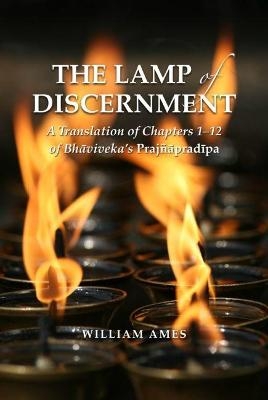
The Lamp of Discernment
A Translation of Chapters 1-12 of Bhāvaviveka’s Prajñāpradīpa
Seiten
2019
Numata Center for Buddhist Translation & Research. (Verlag)
978-1-886439-69-6 (ISBN)
Numata Center for Buddhist Translation & Research. (Verlag)
978-1-886439-69-6 (ISBN)
The Buddhist thinkers of medieval India addressed many of the issues that are still central to Buddhist praxis now. One of the most important of those thinkers is Bhviveka, author of the Prajñpradpa. William Ames has translated, carefully and precisely, the first twelve chapters of that work, which he presents in this volume.
The Buddhist thinkers of medieval India addressed many of the issues that are still central to Buddhist praxis in the present. One of the most important of those thinkers is Bhāviveka, author of the work known as the Prajñāpradīpa. Over several years, William (Bill) Ames translated, carefully and precisely, the first twelve chapters of that work, which he has compiled and revised for consistency in this volume.
The Prajñāpradīpa is a commentary on Nagārjuna’s famous, and in the view of many famously difficult, Mūlamadhyamakārikā—Root Verses on the Middle Way. Central to all Buddhist thought in one form or another is an understanding that the common entities of our experience are transitory and, therefore, unreliable as grounds upon which to base our own happiness, satisfaction, security, and even our own sense of self. As Ames explains in his Introduction, the Madhyamaka pursues this insight further, asserting that all existing entities are lacking in (empty of, śūnyatā) any "intrinsic nature (svabhāva)."
As systematized by later Tibetan scholastics, the Madhyamaka school is understood to have developed into two different forms, the Svātantrika and the Prāsaṅgika, a textbook style simplification that has had lasting influence. In this intellectual historiography where movements require specific founders, Bhāviveka is identified as the founder of the Svātantrika.
Part of the neo-Romantic rhetoric popular in the second half of the twentieth century was that meditation practice was by itself capable of leading to full awakening, or rather to an unimpeded, direct experience of the true and the real. That view has become increasingly untenable, as meditators have themselves attempted to understand the significance of their own experiences. Those who have turned to the teachings of the Buddhist tradition for that understanding are often confronted by the (only) apparent difficulty of understanding emptiness. Ames’ translation of this key work of the Madhyamaka school can contribute to untangling much of the confusion surrounding these ideas.
The Buddhist thinkers of medieval India addressed many of the issues that are still central to Buddhist praxis in the present. One of the most important of those thinkers is Bhāviveka, author of the work known as the Prajñāpradīpa. Over several years, William (Bill) Ames translated, carefully and precisely, the first twelve chapters of that work, which he has compiled and revised for consistency in this volume.
The Prajñāpradīpa is a commentary on Nagārjuna’s famous, and in the view of many famously difficult, Mūlamadhyamakārikā—Root Verses on the Middle Way. Central to all Buddhist thought in one form or another is an understanding that the common entities of our experience are transitory and, therefore, unreliable as grounds upon which to base our own happiness, satisfaction, security, and even our own sense of self. As Ames explains in his Introduction, the Madhyamaka pursues this insight further, asserting that all existing entities are lacking in (empty of, śūnyatā) any "intrinsic nature (svabhāva)."
As systematized by later Tibetan scholastics, the Madhyamaka school is understood to have developed into two different forms, the Svātantrika and the Prāsaṅgika, a textbook style simplification that has had lasting influence. In this intellectual historiography where movements require specific founders, Bhāviveka is identified as the founder of the Svātantrika.
Part of the neo-Romantic rhetoric popular in the second half of the twentieth century was that meditation practice was by itself capable of leading to full awakening, or rather to an unimpeded, direct experience of the true and the real. That view has become increasingly untenable, as meditators have themselves attempted to understand the significance of their own experiences. Those who have turned to the teachings of the Buddhist tradition for that understanding are often confronted by the (only) apparent difficulty of understanding emptiness. Ames’ translation of this key work of the Madhyamaka school can contribute to untangling much of the confusion surrounding these ideas.
William L. Ames did his graduate work in the Buddhist Studies program of the Department of Asian Languages and Literature at the University of Washington in Seattle. He is the author of a number of scholarly papers, chiefly on the Madhyamaka school in India. After working for a number of years as an academic librarian, he is presently retired and lives in the San Francisco Bay Area with his wife, Diane.
| Erscheinungsdatum | 02.12.2019 |
|---|---|
| Reihe/Serie | Contemporary Issues in Buddhist Studies |
| Verlagsort | Berkeley |
| Sprache | englisch |
| Maße | 152 x 229 mm |
| Gewicht | 860 g |
| Themenwelt | Geisteswissenschaften ► Philosophie ► Östliche Philosophie |
| Geisteswissenschaften ► Religion / Theologie ► Buddhismus | |
| ISBN-10 | 1-886439-69-9 / 1886439699 |
| ISBN-13 | 978-1-886439-69-6 / 9781886439696 |
| Zustand | Neuware |
| Haben Sie eine Frage zum Produkt? |
Mehr entdecken
aus dem Bereich
aus dem Bereich


